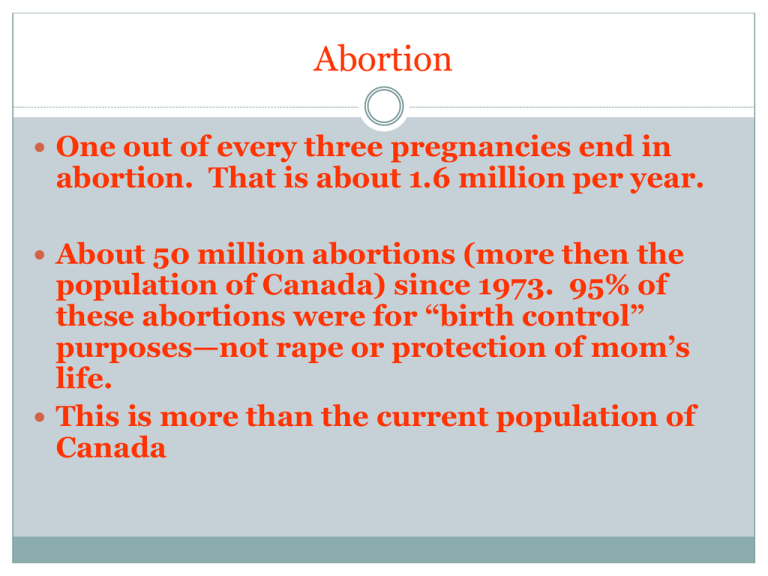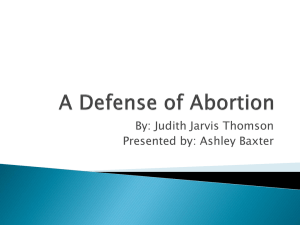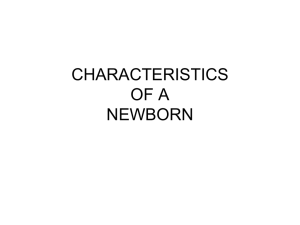
Abortion
One out of every three pregnancies end in
abortion. That is about 1.6 million per year.
About 50 million abortions (more then the
population of Canada) since 1973. 95% of
these abortions were for “birth control”
purposes—not rape or protection of mom’s
life.
This is more than the current population of
Canada
Abortion
Dr. Richard Land points out, “We lose more babies
through abortion every year than the total fatalities
in all of the wars in which we have ever participated,
commencing with the French and Indian War and
including the Revolutionary War, the War of 1812,
the Civil War, the Spanish-American War, World
War I, World War II, Korea, Vietnam, Gulf War I,
and Gulf War II.”
Abortion
64.4% of abortive mothers have never been married.
9.4% of abortive mothers are divorced.
37.4% of abortive mothers claim to be Protestant.
18% of abortive mothers claim to be “born
again/Evangelical Christians.”
Abortion
In 1973, US Supreme Court ruled in Roe vs.
Wade that a woman’s right to privacy
overrules the states’ ability to regulate
abortion. In doing this the court refused to
define when life began—and stated that if it
were ever proven that a fetus has
“personhood” then the case for abortion
would fall.
Hence, the case for pro-choice hinges on
the fact that an unborn child is not fully
human.
Types of Abortion
Suction
The abortionist first paralyzes the cervix (womb
opening). He then inserts a hollow plastic tube with
a knife-like tip into the uterus. The tube is
connected to a powerful pump with a suction force
29 times more powerful than a home vacuum
cleaner. The procedure tears the baby's body into
pieces and the hose frequently jerks as pieces of the
baby become lodged. The placenta is then cut from
the inner wall of the uterus and the scraps are sucked
out into a bottle.
Types of Abortion
Dilatation & Curettage (D&C)
Uncommon today and used during the first 10 weeks
of pregnancy. This is similar to the suction
procedure except that the abortionist inserts a
curette, a loop-shaped steel knife up into the
uterus. He then cuts the placenta and baby into
pieces and scrapes them out into a basin. Bleeding is
usually profuse.
D and C Abortion
Types of Abortion
Dilatation & Evacuation (D&E)
Performed during the second trimester (4-6 months) of
pregnancy. This method has largely replaced saline and
chemical abortions, which too frequently resulted in live
births, a complication from the abortionist’s
perspective! A pliers-like instrument is needed because
the baby’s bones are calcified, as is the skull. There is no
anesthetic for the baby. The abortionist inserts the
instrument into the uterus, seizes a leg or other part of
the body and, with a twisting motion, tears it from the
baby’s body. This is repeated again and again. The
spine must be snapped, and the skull crushed to remove
them. The nurse’s job is to reassemble the body parts to
be sure that all are removed.
D and E Abortion
Types of Abortion
Partial Birth Abortion: Also used for advanced
pregnancies. The cervix is dilated to allow passage of
a ring forceps. A foot or lower leg is located and
pulled into the vagina. The baby is extracted in
breech fashion until the head is just inside the cervix.
The baby’s legs hang outside the woman’s
body. With the baby face-down, scissors are plunged
into the baby’s head at the nape of the neck and
spread open to enlarge the wound
Partial Birth Abortion
Types of Abortion
RU-486
A drug that produces an abortion taken after the
mother misses her period. Its effect is to block the
use of an essential hormonal nutrient by the newlyimplanted baby, who then dies, and drops off. Note
that RU-486 is not a contraceptive because it does
not prevent fertilization or implantation. It is used
only after the mother has missed her period and the
baby is at least two to three weeks old, with a beating
heart (the fetal heart begins to beat when the woman
is four days late for her period). It is no longer
effective after six or eight weeks
Types of Abortion
Salt Poisoninga.k.a. "Candy Apple Babies:"
Most often used after the first trimester (first three
months). The abortionist injects a strong salt solution directly
into the amniotic sac (fluid surrounding the baby). The baby
breathes and swallows it, is poisoned, struggles,
and sometimes convulses. It takes over an hour to kill the
baby. The mother delivers the dead baby in a day or two
(sometimes alive!). Why "candy apple" babies? The
corrosive effect of the salt solution often burns and strips
away the outer layer of the baby’s skin. This exposes the raw,
red, glazed-looking subcutaneous layer of tissue. The baby’s
head sometimes looks like a candy apple. Some have also
likened this method to the effect of napalm on innocent war
victims. This technique was originally developed in the
concentration camps in Nazi Germany.
Saline Abortion
Biblical arguments
Biblical arguments for fetus being
subhuman
Genesis 2:7-Adam was given life when
“breath” was put in him.
Job 34:14-15-If God withdrew his spirit and
“breath” all mankind would perish.
Isaiah 57:16—“the breath of man that I have
created”.
Matthew 26:24 “better for Judas to have not
been born”. Why not “conceived”?
Other arguments
Other arguments for fetus being subhuman
self-consciousness—a baby is not human until it possesses selfconsiousness
physical dependence—the baby is an extension of the mother’s
body. Since it is a part of her body and reproductive system—she
has the right to abort it.
Safety of the mother—illegal abortion is dangerous
Abuse and neglect—helps prevent child abuse
Deformity—no child should have to live deformed
Privacy—woman’s right of privacy over her body is Supreme
Rape—in cases of rape, a baby should be aborted
Biblical arguments against abortion
Ps. 139 vs. 13-15 Unborn are intimately known by God.
Ps 139:13 For thou hast possessed my reins: thou hast
covered me in my mother's womb.
14 I will praise thee; for I am fearfully and wonderfully
made: marvellous are thy works; and that my soul knoweth
right well.
15 My substance was not hid from thee, when I was made in
secret, and curiously wrought in the lowest parts of the
earth.
Jeremiah 1:5 God called the unborn for service
More biblical arguments
Jer 1:5 Before I formed thee in the belly I knew thee; and
before thou camest forth out of the womb I sanctified thee,
and I ordained thee a prophet unto the nations.
Is. 49:1
Isa 49:1 Listen, O isles, unto me; and hearken, ye people,
from far; The LORD hath called me from the womb; from
the bowels of my mother hath he made mention of my
name.
Gen. 25:22-23—Jacob , Judg. 13:2-7—Samson , Gal.
1:15—Paul
Ps. 51:5 (sin is attributed to the unborn)
Ps 51:5 Behold, I was shapen in iniquity; and in sin did my
mother conceive me.
More arguments
Luke 1:41-44 (same greek word for baby inside or outside the womb)
Lu 1:41 And it came to pass, that, when Elisabeth heard the salutation of
Mary, the babe leaped in her womb; and Elisabeth was filled with the
Holy Ghost:
42 And she spake out with a loud voice, and said, Blessed art thou
among women, and blessed is the fruit of thy womb.
43 And whence is this to me, that the mother of my Lord should come to
me?
44 For, lo, as soon as the voice of thy salutation sounded in mine ears,
the babe leaped in my womb for joy.
Ex. 21:22-25 (baby before birth has same rights as after birth)
Ex 21:22 ¶ If men strive, and hurt a woman with child, so that her fruit
depart from her, and yet no mischief follow: he shall be surely punished,
according as the woman's husband will lay upon him; and he shall pay
as the judges determine.
23 And if any mischief follow, then thou shalt give life for life,
24 Eye for eye, tooth for tooth, hand for hand, foot for foot,
25 Burning for burning, wound for wound, stripe for stripe.
Medical arguments against abortion
At conception embryo is genetically different from mother (23
chromosomes from each parent. (DNA from embryo cannot
be distinguished from an adult) All that is added is food,
water, and oxygen.
Sex of the child is determined at conception
Definition of death—
-heartbeat—18th day of “life” heartbeat can be distinguished
-brain-wave—detected about 40 days after conception
4) Countless biologists and doctors have established
conception as beginning of life.
Legal arguments
Supreme court refused to “define” life
“We need not resolve the difficult question of when life begins. When
those trained in the respective disciplines of medicine, philosophy, and
theology are unable to arrive at any consensus, the judiciary, at this
point in the development of man’s knowledge, is not in a position to
speculate as to an answer.”
-burden of proof should be with the life-taker, not life giver
-burden of proof in law lies with the prosecution
Declaration of Geneva “I will maintain the utmost respect for human life,
from the moment of conception.”
U.N. Declaration of the Rights of the Child “The child, by reason of his
physical and mental immaturity, needs special safeguards and care,
including appropriate legal protection, before as well as after birth”.
Hippocratic Oath
Philosophical arguments
Slippery slope—opened the door for when does a human become a person
Dr. Francis Crick “a child should be considered legally born after two
days so it could be examined to see whether it was an acceptable member
of society.
Ashley Montagu “newborn baby is not human until it has been shaped by
society.
Joseph Fletcher “set minimum IQ of 40 to be truly human”
If the fetus isn’t alive, then is it dead?—there is not a way to describe it’s
state if it isn’t alive
Premature babies—many were delivered as early as 20 weeks and lived. If
this is considered alive and a person, why is a 20 week old fetus not a
More arguements
All arguments for abortion can apply to infants and elderly.
Abortion has been declared wrong by many societies and moralists
Code of Hammurabi
Mosaic law
Tiglath-pileser (persian law)
Hippocrates (put it in his oath)
discrimination based on size, age, location, or functional ability is
morally wrong—this should apply to abortion as well
Difficulties from the Christian view
mother’s life at stake (tubal pregnancy)
birth control—doesn’t allow fertilized egg to attach
to womb
½ of conceptions abort themselves (don’t attach to
wall)—why don’t we try to protect them?









